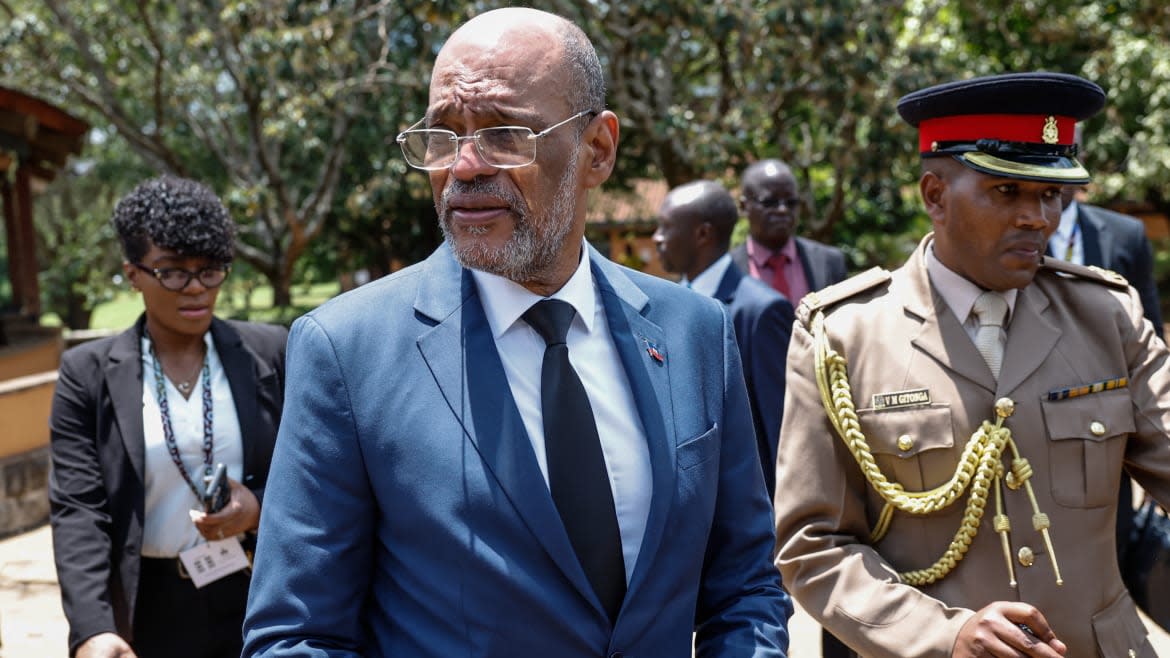U.S. Urges Haiti’s Prime Minister to Transfer Power as Gangs Threaten ‘Genocide’

The United States is formally asking Haiti’s prime minister to step aside and allow for a political transition of power as the havoc being wreaked in the capital by an alliance of heavily armed rebel gangs threatens to escalate into full-on civil war.
Prime Minister Ariel Henry, 74, remained stranded abroad on Wednesday after his plane was diverted in the midst of an attempt to return home from a diplomatic mission to Kenya a day prior. According to a report in the Miami Herald, he backtracked and landed in Puerto Rico after the Dominican Republic, which shares the island of Hispaniola with Haiti, refused him permission to land.
Mid-flight, U.S. officials called and urged him to step aside, the Herald reported. Linda Thomas-Greenfield, the U.S. ambassador to the United Nations, confirmed only that the government had asked Henry to “move forward on a political process that will lead to the establishment of a presidential transitional council that will lead to elections,” according to The Washington Post.
“We think that it’s urgent that he moves forward in that direction and start the process of bringing normalcy back to the people of Haiti,” she added.
Henry, a neurosurgeon who ascended to become the nation’s de facto head of state after the 2021 assassination of President Jovenel Moïse, was supposed to step down last month. He has thus far resisted calls to form a transitional government, one person familiar with the diplomatic proceedings told The Wall Street Journal.
Jimmy Chérizier, the crime lord known as “Barbecue” who heads a powerful gang alliance, told reporters on Tuesday that the coordinated violence that erupted last week while Henry was out of the country would only worsen should he remain in office.
“If Ariel Henry doesn’t resign, if the international community continues to support him, we’ll be heading straight for a civil war that will lead to genocide,” the former police officer said at a press conference. “Either Haiti becomes a paradise or a hell for all of us. It’s out of the question for a small group of rich people living in big hotels to decide the fate of people living in working-class neighborhoods.”
Six days ago, after Henry announced that long-promised elections wouldn’t occur until at least next year, Chérizier and other gang leaders came together with the explicit mandate of ousting Henry. They laid siege to Port-au-Prince over the weekend, attacking police stations and attempting to violently wrest control of the city’s international airport. On Sunday, Haitian officials declared a 72-hour state of emergency after the alliance launched an assault on two major jails, loosing thousands of inmates out onto the streets.
Violent skirmishes between rebels and police continued through Tuesday evening, but a police administrator told the Journal that the airport’s perimeter had been secured, though the facility itself remained closed and under guard. The Journal reported the capital was “calm” on Wednesday, though resources remained scarce and medical facilities overwhelmed.
“We can’t hold on much longer,” Jean Philippe Lerbourg, medical director of the university Hospital La Paix, told the Post on Wednesday. “We’re running low on blood, and we’re short-staffed because many can’t reach the hospital.”
Henry has been silent and out of sight since Friday, when he was photographed in Nairobi signing a formal agreement with the Kenyan government to proceed with its offer to spearhead a United Nations-backed multinational police force to restore law and order in Haiti. The agreement’s status on Wednesday was unclear, with the U.N. Security Council set to hold an emergency meeting on the matter on Wednesday.
A U.S. State Department spokesman denied that they were actively pushing Henry to step down. “We are not calling on him or pushing for him to resign, but we are urging him to expedite the transition,” Matthew Miller said.
But Ronald Sanders, the ambassador of Antigua and Barbuda to the U.S., told the Post on Tuesday that the State Department had sent Henry a message that included language that the embattled politician could use while announcing his resignation. A Haitian politician who participated in recent discussions with Haitian leaders and the Caribbean Community bloc, which held its own emergency meeting on Tuesday, told the newspaper that Henry’s resignation was “inevitable.”
Get the Daily Beast's biggest scoops and scandals delivered right to your inbox. Sign up now.
Stay informed and gain unlimited access to the Daily Beast's unmatched reporting. Subscribe now.


